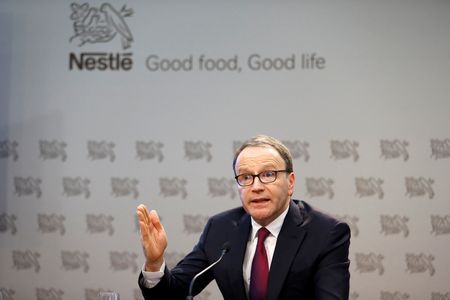 1
1 1
1
LONDON (Reuters) – Nestle will raise prices at a more moderate rate in the remainder of 2023, its CEO said on Thursday, as the company hit back at criticism that food manufacturers are charging more than they need to.
Consumer goods companies have raised prices in the past two years in response to the impact of the COVID-19 pandemic, disruption to crop yields from unusual weather patterns and Russia’s invasion of Ukraine.
Retailers, politicians, consumers and the media have in turn accused the industry of price-gouging, with France’s finance minister last month ordering food producers to cut prices or face fines.
“We don’t consider those (accusations) to be an accurate description of where we are,” Nestle CEO Mark Schneider told reporters. “And we’ve priced very moderately and very conservatively.”
Nestle, which makes Kit Kat chocolate wafer bars and Nescafe coffee, reported a 10.6% rise in earnings per share in the first half of 2023, when it raised prices by an average of 9.5%. It also reported higher-than-expected organic sales.
“Our profitability in southern Europe is significantly down…This is in spite of all the internal efficiency measures that we’re taking,” Schneider said. “The French situation is even worse than the one that you’ve seen for Europe.”
Price rises “will moderate” in the second half of the year and “be a lot more targeted to products that are still subject to input cost inflation,” Schneider said.
Nestle and rival Danone are among firms whose product prices in France have risen by more than 10% this year, according to NielsenIQ data analyzed for Reuters by Bernstein, potentially putting them under government pressure to renegotiate with French retailers.
The CEO of Carrefour, Europe’s biggest food retailer, on Wednesday accused suppliers of not cooperating in those re-negotiations.
(Reporting by Richa Naidu; editing by Matt Scuffham and Sharon Singleton)